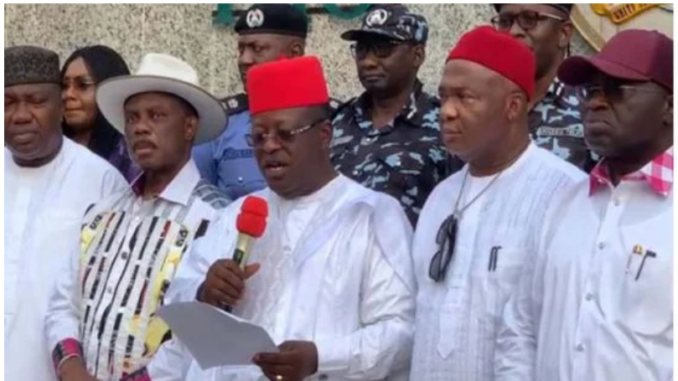
IT is worrisome that many parts of the five states of the South-East have been gripped in unrelenting terrorist activities orchestrated by the so-called “unknown gunmen.” Fingers are being pointed in the direction of the proscribed Indigenous People of Biafra and its Eastern Security Network arm that are championing agitation for self-determination in the region. The group has however denied any involvement in the orgy of violence. Regardless, while peaceful agitation for self-determination is a fundamental right, resorting to terrorism is condemnable. It must be crushed.
It is universally accepted that two wrongs never make a right, and any resort to self-help outside of what extant laws permit is criminal. Similarly, the excessive use of force and state terror against the innocent by security forces are condemnable. The South-East states are in the grip of these manifestations. All stakeholders should rally to stop the bloodbath.Political, traditional, and religious leaders and other opinion moulders in the region should rise to the challenge. This goes beyond partisan politics.
Stripped bare, the brutal activities of the “unknown gunmen” amount to terrorism; nothing less. Ironically, their major victims are the same people they purport to be seeking to “liberate,” and whose lives are wasted, livelihoods upturned, and social activities disrupted. In the four weeks to February 11, the media reported no fewer than 15 persons brutally murdered in Anambra, Enugu and Ebonyi states.
The United States’ Federal Bureau of Investigation’s description of terrorism as “the unlawful use of force or violence against persons or property to intimidate or coerce a government, the civilian population, or any segment thereof, in furtherance of political or social objectives” is apt.
The crisis is compounded by the incompetence, leadership failure and institutional incapacity of the security agencies and the political leadership at the federal and state levels. The security agencies have so far failed to unravel the identities of the gunmen and their sponsors since the twin attacks on the Imo State Police Command Headquarters and the Nigerian Correctional Service centre, Owerri, where 1,800 inmates escaped in 2021.Instead, their response has been accompanied by human rights abuses, profiling of innocent residents and travellers, and assault on communities. This is counterproductive.
Since the beginning of 2022, following a lull in their deadly activities, the terrorists have re-emerged. Recently, gunmen attacked and razed the Okwelle Divisional Police Headquarters in Onuimo Local Government Area of Imo State. A week earlier, some gunmen had attacked the Isu Divisional Police HQ, also in Imo, killing two officers. On February 25, gunmen had shot and killed one person at Oko, Orumba North LGA of Anambra State. Reports said the gunmen operated freely for about 30 minutes and kidnapped two persons.Last weekend, rampaging gunmen killed two persons at Ekwulobia, one at Oko and another at Amaokpala, in the same state.
But by far the most high-profile killings in recent days were those of a professor of economics and former Permanent Secretary in the old Anambra State, Obidinma Onyemelukwe, and billionaire businessman, Gab Ofoma. According to multiple accounts, the 88-year-old don, who was the father of the winner of the NLNG Prize for Literature 2021, Cheluchi Onyemelukwe, was returning to Nanka from Enugu with his wife when he was attacked by the hoodlums. Ofoma was gunned down days later when he visited his country home in Nnewi, Anambra State, and was returning to his base in Port Harcourt, Rivers State.
Enugu has not escaped the orgy of violence. Five persons were reportedly killed while participating in the LG election held in the state recently. This prompted Governor Ifeanyi Ugwuanyi to summon a meeting of all stakeholders in the area, where he banned the operations of commercial motorcycles (okada), and of tricycles (Keke NAPEP), in the state. He rescinded his decision a few days ago.
One incident had the potential of precipitating an ugly inter-ethnic and inter-religious confrontation in the region. The killing of eight cattle traders from northern Nigeria in Omuma Uzo, Ukwa West council area of Abia State by gunmen rekindled inter-ethnic disunity. Luckily, the tension was quickly nipped in the bud by Governor Okezie Ikpeazu, who paid N2 million each as compensation to the families of the victims. Sadly, the perpetrators have not been found. This cannot continue.
Solving the crisis requires purposeful leadership at the national and sub-national levels. It has revealed a glaring failure of effective political governance in the region as demonstrably, the state governors lack the capacity to secure lives and property, which is the primary duty of government.
For a start, they should ignite the proposed Ebubeagu regional security system. In addition, they should create state vigilance agencies, train, and fund and arm them to complement the federal and regional security organisations. There is an urgent need to mobilise the people who are at the receiving end, to actively join in identifying, monitoring, reporting, apprehending, and repelling the terrorists. Town unions, community groups, local vigilantes, traditional institutions, and youths should be engaged in the fight.
The people, traumatised by the illegal and violent enforcement of sit-at-home orders by non-state actors, should mobilise and stoutly resist the asphyxiation of their livelihoods. Participating in civic action is voluntary.
The federal security agencies, including the military, should urgently review their strategies in the South-East. Profiling, extrajudicial killings, and brutalisation of the innocent only provoke more violence.The United States Army War College’s Strategic Studies Institute declares, “Using force in a focused, appropriate manner requires good intelligence. Only by knowing who the insurgents are can the security forces target them without causing unnecessary casualties among the general population.” It said this requires voluntary cooperation from the people “persuaded that the government can protect them.”
A combination of hard and soft power will therefore go a long way in winning back the confidence, trust, and cooperation of the locals. The federal and state governments are obligated to unmask the unknown gunmen and bring them to justice. They should act without further delay.
END

Be the first to comment